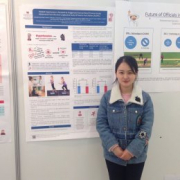
The ISH is positively committed to opposing discrimination against people on the grounds of gender, race, colour, nationality, religion, marital status, sexual orientation, class, age, disability, having dependants, HIV status or perceived lifestyle.
Our latest tweets
Follow us @ISHBP to keep up to date with the latest offers and news
In a series of video interviews for @ISHBP, @mari_br_montrea explores diverse career paths and the impact that #mentorship can have in career development.
Watch the first interview with Michele Mazzaron de Castro:
#hypertension
Mitigating #preeclampsia risk requires both advanced diagnostics and accessible interventions that can be implemented widely, writes @mari_br_montrea of @cusm_muhc in the latest edition of Hypertension News.
✒️https://ish-world.com/wp-content/uploads/2024/12/HTN-Dec-2024-ARTICLE-H.pdf
#hypertension #highbloodpressure
Recommendations for home #bloodpressure measurement are inconsistent between guidelines.
Hear from @EleanorClapham1 and @Dr_NChapman on why there may be a need to improve the consistency in recommendations made across guidelines for HBPM.
🔗https://ish-world.com/wp-content/uploads/2024/12/HTN-Dec-2024-ARTICLE-C.pdf
Our December 2024 edition of #Hypertension News is out now!
In this edition:
🥇 2024 ISH award winners
⌚ BP measurement technology
🧬 The genetics of #bloodpressure
⚠️ War-induced stress and #hypertension
🛣️ A roadmap for BP control in Australia
➡️https://ish-world.com/ish-hypertension-news/








Our Corporate Members
Companies wishing to become Corporate Members of the ISH should contact the Secretariat for further details >> secretariat@ish-world.com
Affiliated sponsors


Platinum corporate members
Silver corporate members
© 2023 International Society of Hypertension. All rights reserved. | Terms & Conditions | Privacy | Home | created by eb-webdesign.com


















